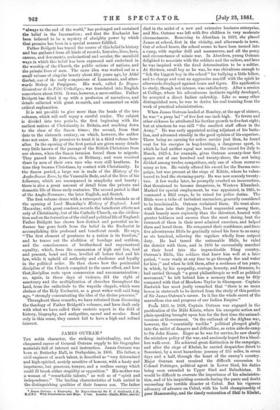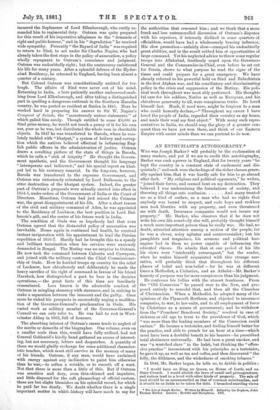JAMES OUTRAM.* 'RIB noble character, the striking individuality, and the
chequered career of General Outram supply to his biographer materials full of interest and instruction. James Outram was born at Butterley Hall, in Derbyshire, in 1803. His father, a civil engineer of much talent, is described as "very determined and high-spirited, acutely sensitive of honour, with a hasty and impetuous, but generous, temper, and a restless energy which could ill brook either stupidity or opposition." His mother was a woman of "remarkable talents," as well as of "spirit and independence." The leading characteristics of both united in the distinguishing qualities of their famous son. The father
• James Outran': a Biography. By Major General Sir F. J. Goldsmid, C.B., With Illustrations and Maps. 2 vole. London : Smith, Bider, and Co.
died in the midst of a new and extensive business enterprise, and Mrs. Outram was left with five children in very moderate circumstances. Removing to Aberdeen in 1810, she placed James at school, first in the vicinity, and afterwards in town. Out of school hours, the school seems to have been turned into a camp, with regular drill and mancenvres, and all the pomp and circumstance of mimic war. In Aberdeen, young Outram delighted to associate with the soldiers and the sailors, and here he was inspired with the fixed determination to be a soldier. At thirteen, small boy as he was, he was chivalrous enough to "lick the biggest boy in the school" for bullying a little fellow, and to charge and rout an aggressive mastiff witlithe spirit he afterwards displayed against boars and tigers. His application to study, though not intense, was satisfactory. After a session at College, where his adventurous instincts rapidly developed, he accepted a direct Indian cadetship. Like so many other distinguished men, he was to derive his real training from the work of practical administration.
When James Outram landed at Bombay, at the age of sixteen, he was "a puny lad" of five feet one inch high. To fevers and other sickness he attributed his further growth to five feet eight; but at nineteen he was still "the smallest staff officer in the Army." He was early appointed acting adjutant of his batta- lion, and advanced steadily in the good opinion of his superiors. There being no opening for active service just then, he found vent for his energies in hog-hunting, a dangerous sport, in which he had neither equal nor second ; the record for July to March, 1823-4, for example, gives Outran, seventy-four first spears out of one hundred and twenty-three, the rest being divided among twelve competitors, only one of whom scores so many as ten. He vainly offered his sword for the Burma cam- paign, but was present at the siege of Kittair, where he volun- teered to lead the storming-party. He was now scarcely twenty- two. A few weeks later, he promptly crushed an insurrection, that threatened to become dangerous, in Western Khandesh. Marked for special employment, he was appointed, in 1825, to command a Bhil corps, to be raised for police duties. The Bhils were a tribe of turbulent marauders, generally considered to be irreclaimable. Outram reclaimed them. He went alone with them into their jungles, lived unguarded among them, drank brandy more copiously than the thirstiest, hunted with greater boldness and success than the most daring, beat the foremost of them in their most admired exercises, and helped them and loved them. He conquered their confidence, andfrom five adventurous Bhils he gradually raised his force to as many as six hundred, relieving the regulars wholly from outpost duty. He had tamed the untamable Bhils, he ruled the district with them, and in 1830 he successfully marched at their head into the impracticable Diing country. Outram's Bhils, like soldiers that knew him well at a later period, "were ready at any time to go through fire and water for him ;" and when he left them, after a residence of ten years, in which, by his sympathy, courage, honesty, and firmness, he had carried through "a great philanthropic as well as political movement," he left behind him a memory that may be fitly compared with that of Meadows Taylor in Shorapoor. - Captain Eastwick has most justly remarked that "there is no mean lesson in statecraft to be derived from the study of this portion of Sir James Outram's career. In it lies the whole secret of the marvellous rise and progress of our Indian Empire."
FrA 1835 to 1838, Captain Outram was engaged in the pacification of the Mai Mate, where his energetic action and plain-speaking brought upon him for the first time the animad- versions of Government. On the outbreak of the Afghan war, however, the "essentially warlike" political plunged gladly into the midst of dangers and difficulties, as extra aide-de-camp to Sir John Keane. Eager as he was for service, he saw clearly the mistaken policy of the war, and anxiously hoped for a blood- less walk-over. He achieved great distinction in the campaign, and after the siege of Khelat, he carried despatches direct to Somniani, by a most hazardous journey of 355 miles, in seven days and a half, through the heart of the enemy's country. Major Outram next received the difficult succession to Colonel Pottinger, political agent in Lower Sind, his duties being soon extended to Upper Sind and Baluchistan. It would be difficult to overrate the importance of his administra- tion, and of his inspiriting counsels during the panic and doubt succeeding the terrible disaster at Cabal. But his vigorous advocacy of advance on Cabal, with his bold championship of poor Hammersley, and the timely restoration of Shill to Khelat,
incurred the lispleasure of Lord Ellenborough, who curtly re- manded him to regimental duty. Outram was quite prepared for this result of his imperative allegiance to the "demands of right and public honour," and, in his " degradation " he received wide sympathy. Presently" the Bayard of India" was required to return to Sind, to act under Sir Charles Napier, who had already taken the first steps in the policy of annexation, a policy wholly repugnant to Outram's conscience and judgment. Outram was undoubtedly right ; but the controversy embittered his life for many years. After a splendid defence of the Hyder- abad Residency, he returned to England, having been absent a quarter of a century.
But Colonel. Outram was constitutionally unfitted for fur- lough. The affairs of Sind were never out of his mind. Returning to India, e bore patiently another undeserved snub- bing from Lord Ellenborough, and after taking a distinguished part in quelling a dangerous outbreak in the Southern Maratha country, he was posted as resident at Satara in 1845. Here he worked hard in preparing his answer to Sir W. Napier's Conquest of Scinde, the "monstrously untrue statements" of which galled him sorely. Though entitled to some £3,000 as Sind prize-money, he would not touch a penny of it for his own use, poor as he was, but distributed the whole sum in charitable objects. In 1847 he was transferred to Baroda, where he reso- lutely tackled with " khatpat," a system of bribery and corrup- tion which the natives believed effectual in influencing Eng- lish public officers in the administration of justice. Outram draws a revolting piciure of the state of things in Baroda, which he calls a "sink of iniquity." He thought the Govern- ment apathetic, and the Government thought his language "intemperate and indiscreet ;" and his special report on khat- pat led to his summary removal. In the long-run, however, Baroda was transferred to the supreme Government, and Outram was victoriously reinstated by Lord Dalhousie, to the utter destruction of the khatpat system. Indeed, the greater part of Outram's proposals were actually carried into effect in 1854-5, under orders of the Government of India or the Court of Directors. Meantime, Outram had just missed the Crimean war, the great disappointment of his life. After a short tenure of the civil and military command of Aden, he was appointed to the Residency of Lucknow, the best position in Lord Dal- housie's gift, and the centre of his future work in India.
The condition of Oude was so hopelessly bad that even Outram agreed that the distasteful policy of annexation was inevitable. Home again in continued bad health, he received. instant invigoration with his appointment to lead the Persian expedition of 1856-7. Hardly had he brought this to a speedy and brilliant termination when his services were anxiously demanded in Bengal. The Mutiny was no surprise to Outram. He now took the command between Calcutta and Cawnpore, and joined with the military control the Chief Commissioner- ship of Oude. How he harried troops up country for the relief of Lucknow, how chivalrously and deliberately he made the heavy sacrifice of his right of command in favour of his friend Havelock, how distinguished a part he bore in the decisive operations,— the great facts of this time are familiarly remembered. Less known is the admirable conduct of Outram in mingling clemency with sternness, and in striving to make a separation between the innocent and the guilty. Once more he risked his prospects in successfully urging a modifica- tion of the Governor-General's proclamation in Oude. His varied work as military member of the Governor-General's Council we can only refer to. He was laid to rest in West- minster Abbey in 1863, full of honours.
The absorbing interest of Outram's career tends to neglect of the merits or demerits of the biographer. One volume, even on a smaller scale than this, would have fully sufficed, had not General Goldsmid's kindly hand gathered an excess of interest- ing, but not necessary, letters and despatches. A quantity of these we would gladly exchange for some additional character- istic touches, which must still survive in the memory of many of his friends. Outram, if any man, would have exclaimed with energy against any inclination to paint him otherwise than he was,—to soften a wrinkle, or to smooth off a wart. Not that there is more than a little of this. But if Outram was sensitive and fiery, even thin-skinned and impulsive, and little disposed for the soft phraseology of official custom, these are but slight blemishes on his splendid record, for which he paid far too dearly. We doubt Whether there is a single important matter in which,history will have much to say for the authorities that censured him ; and we think that a more frank and less untrammelled discussion of Outram's disputes with his superiors, if intensely disliked in some quarters of officialdom, would have hal a wholesomely bracing influence. His slow promotion—unfairly slow—cramped his undoubtedly great abilities, and in the result robbed him of opportunities of large command. Yet his neglected advice to throw some regular troops into Allahaba,d, fruitlessly urged upon the Governor- General and the Commander-in-Chief, even before he set out for Persia, shows to what purpose he read the signs of the times and could prepare for a great emergency. We have already referred to his powerful hold on Sind and Baluchistan in the first Afghan war, and his conciliatory and discriminating policy in the crisis and suppression of the Mutiny. His poli- tical work throughout was most ably performed. His thought- ful care for his soldiers, Native as well as European, and hip chivalrous generosity to all, were conspicuous traits. He loved himself last. Much, if need were, might be forgiven to a man who could honestly declare,—" Throughout my career I have loved the people of India, regarded their country as my home, and made their weal my first object." With many such repre- sentatives in India, we should reap the glory of a greater con- quest than we have yet won there, and think of our Eastern Empire with easier minds than we can pretend to do now.



































 Previous page
Previous page